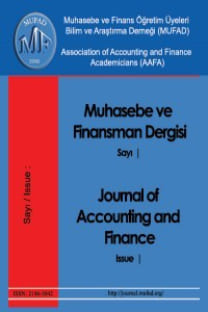Day of the week anomaly for Istanbul gold exchange: Gold and silver data
Bu çalışma İstanbul Altın Borsası altın ve gümüş referans fiyatlarını kullanarak,Ağustos 2008 ve Aralık 2011 tarih aralığı için getiri ve oynaklıkta haftanın günü etkisiniaraştırır. Altın için getiri ve oynaklıkta haftanın günü etkisine rastlanmıştır. Gümüş için isesadece oynaklıkta haftanın günü etkisine rastlanmıştır. Altın ve gümüş oynaklıklarıkarşılaştırıldığında altın daha oynak bulunmuştur. Altın ve gümüş oynaklıklarının olumlu veolumsuz haberlere verdikleri tepki farklı olmuştur. Bu çalışma İstanbul Altın Borsası altın vegümüş referans fiyatları için haftanın günü anomalisini GARCH metodolojileri kullanarakinceleyen ilk çalışmadır. Bu çalışmanın bulguları ulusal ve uluslararası yatırımcıların işlemstratejilerini belirlemesi, yatırım kararlarını alması, risk yönetimi ve portföy performansınındeğerlendirilmesi açısından etkiler taşımaktadır.
İstanbul altın borsası altın ve gümüş referans fiyatları için haftanın günü anomalisi
This study investigates the day of the week effect on gold and silver, return andvolatility, for Istanbul Gold Exchange (IGE) through the period August 2008 and December2011 using reference exchange rates. For gold, the empirical results provide evidence for theexistence of the days of the week anomaly for return and volatilities. For silver, days of theweek anomaly is found only for volatility but not for return. When we compare gold and silvervolatility, we find that gold is more volatile than silver. We also find that gold and silvervolatility gives different reactions to good and bad news. This will be the first study on thecalendar anomalies on gold and silver, return and volatility, for Istanbul Gold Exchangeusing GARCH methodology. The findings of this study has implications for local and international investors for designing trading strategies, drawing investment decisions, risk management and portfolio performance evaluation.
___
- Aktas, H.- Kozoglu, M. (2007), Haftanın Günleri Etkisinin İstanbul Menkul Kıymetler Borsasında GARCH Modeli ile Test Edilmesi, Finans, Politik & Ekonomik Yorumlar Dergisi, Cilt 44, Sayı 514, s. 37-45.
- Balaban, E. (1995), Day of the Week Effects: New Evidence from an Emerging Market, Applied Economics Letters, Vol. 2, pps.139-143.
- Ball, C.- Torous, W. Tschoegl, A. (1982), "Gold and the Weekend Effect", Journal of Futures Markets, Vol. 2, No.2, pp.175-82.
- Berument, H. - Kiymaz, H. (2001), The day of the week effect on stock market volatility, Journal of Economics and Finance, Vol. 25, pp.181-193. Berument, H. Inamlik, A. Kiymaz, H. (2004), The Day Of The Week Effect On Stock Market Volatility:The Case of Istanbul Stock Exchange, Iktisat İşletme ve Finans, Cilt 19 Sayı 223, pp.91-102.
- Bildik, R. (2000), Hisse Senedi Piyasalarında Dönemsellikler ve İMKB zerine Ampirik Bir Çalışma, İMKB Yayınları, İstanbul.
- Bollerslev, T. (1986), Generalized Autoregressive Conditional Heteroskedasticity, Journal of Econometrics, Vol. 31, pp.307-327.
- Carlos, M. J. - Bera, A. K. (1987), A Test for Normality of Observations and Regression Residuals, International Statistical Review, Vol. 55, No. 2, pp.163-172.
- Chamberlain, T. Cheun, C. S. Kwan, C. (1990), "Day of the Week Patterns in Futures Prices : Some Further Results", Quarterly Journal of Business and Economics, Vol. 29, No. 2, pp.68-89.
- Chang, E. Kim, C. (1988), "Day of the Week Effects and Commodity Price Changes" Journal of Futures Markets(April), pp.229-41.
- Dicle, M Hassan, K. (2007), Day of the Week Effect in Istanbul Stock Exchange, Scientific Journal of Administrative Development, No. 5.
- Ergul N. Akel, V. Dumanoglu, S. (2009), Haftanın Günü Etkisi İMKB İkinci Ulusal Pazarda Geçerli midir? Maliye ve Finans Yazıları Dergisi, Yıl 22, Sayı 82, pp.57-73.
- French, K.R. (1980), Stock Returns and The Weekend Effect, Journal of Financial Economics, Vol. 8, pp.55-69.
- Johnston, E. - Kracaw, W. M. J. (1991), "Day of the Week Effects in Financial Futures: An Analysis of Gnma, T-Bond, T-Note and T-Bill Contracts", Journal of Financial And Quantitative Analysis, Vol. 26, No. 1, pp.23-44.
- Kıyılar, M. Karakas, C. (2005), İstanbul Menkul Kıymetler Borsasında Zamana Dayalı Anomalilere Yönelik Bir İnceleme, Yönetim Dergisi, İ.Ü.,İşletme İktisadı Enstitüsü, ss.16- 52.
- Ma, C. (1986), "A Further Investigation of the Day-of-the-Week Effect in the Gold Market" , Journal of Futures Markets, Vol. 6, No.3, pp.409-19.
- Muradoglu, G. Oktay, F. T. (1993), Calendar Anomalies at Istanbul Stock Exchange, Hacettepe University Faculty of Business Administration Journal, Vol. 11.
- Nelson, Daniel B. (1991), Conditional Heteroskedasticity in Asset Returns: A New Approach, Econometrica, Vol. 59, No. 2, pp. 347-370.
- Oguzsoy, C.B. Guven, S. (2003), Stock Returns and the Day-of-the-Week Effect in İstanbul Stock Exchange, Applied Economics. Vol.35, pp.959-971.
- Tully, Edel Lucey, Brian M. (2005), Seasonality, Risk And Return In Daily COMEX Gold And Silver Data 1982-2002, IIIS Discussion Paper, January, http://www.tcd.ie/iiis/documents/discussion/pdfs/iiisdp57.pdf (22/07/2012)
- Tuncel, A.K. (2007), İMKBde Haftanın Günü Etkisi, Akdeniz İİBF Dergisi, Sayı 13, ss.252-265.
- www.iab.gov.tr (22/07/2012), Istanbul Gold Exchange.
- www.gold.org , (22/07/2012), World Gold Council, Gold Demand Trends, First Quarter, May.
- ISSN: 2146-3042
- Yayın Aralığı: 4
- Başlangıç: 2005
- Yayıncı: Muhasebe ve Finansman Öğretim Üyeleri Derneği (MUFAD)
